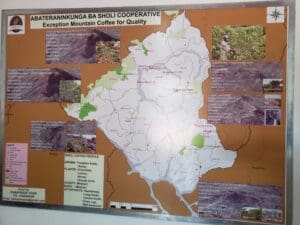After a long-awaited reunion this June, we visited our partners at Abateraninkunga ba Sholi ("Sholi") in Muganga district, Rwanda. The members at Sholi have been producing such high-quality, consistent coffee that it’s become a favorite competition coffee.
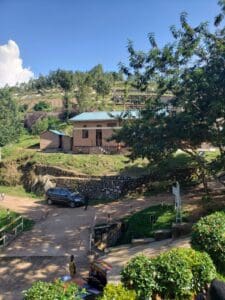
Sholi's central washing station.
We first toured the largest washing station, which now includes 3 solar dryers, expansive drying tables, and a wastewater treatment plant (Sholi is certified Fairtrade, Organic, and Rainforest Alliance, among others).
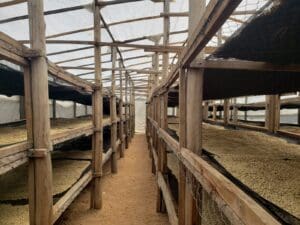
Parabolic dryers at Sholi's central washing station.
The Cooperative planted 185,000 trees in 2022, is expanding its coffee land, has a second, smaller washing station about an hour away from the central washing station and store, and gives away free bourbon seedlings to farmers. It currently has 619 members, 241 of whom are women.
They have started a community transformation program for 70 young single mothers aged 18-25, teaching them how to save, starting small savings and credit groups, and giving them a collective coffee field. Any cherries sold to the cooperative from that field go directly to the women.
Sholi also began, with grants from Café Feminino Foundation, a women's and children’s nutrition program in the community, where kids ages 2 to 5 who are identified as susceptible to malnutrition attend the program four days per week out of nine months and receive fortified porridge, learn simple counting and songs, and parents attend monthly educational meetings.
We visited the health clinic, which Sholi built in 2016 with grants, its cooperative profits, and contributions from individual members. The clinic includes a full-time nurse, family planning, wound care, small pharmacy, and is able to treat basic first aid, malaria, and many common gastrointestinal ailments.
Sholi has faced significant climate-change challenges, from extreme flooding in February of this year that washed out a key bridge, effectively blocking any cherry delivery to the washing station until it was repaired (thankfully, Atlas was able to work out a pre-payment for coffee in order to get funds to them quickly for the repairs), to challenges with drought and even hail.
We cupped a number of both washed and natural process lots with Sholi’s three excellent lab staff, Tusishimire Pascal, Umutomiwimaya Elisabeth, Mukamurera Claudine, who trained weekly for over a year in a cohort of 10 and had the top marks of the group in both a practical and written examination. After less cupping for all of us during COVID, it was a relief and celebration to find us extremely calibrated!
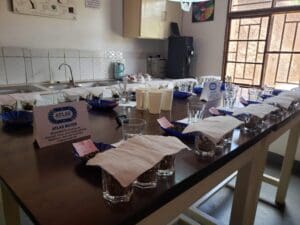
Sholi's cupping lab.
Sholi continues to push both its quality standards and offerings. For naturals, they float, sort, float again, and have a special process of creating a ‘cocoon’ of sorts, for anaerobic processing, for 2-3 days before drying the coffee for up to 43 days on the raised beds. They have also identified and mapped five particularly high-altitude growing areas, with good soil and shade trees within their communities as a way to create additional potential traceable microlots.
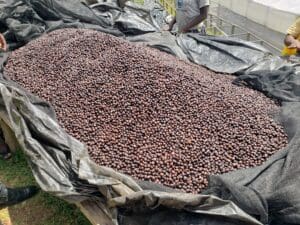
Cherry after drying in the cacoon.
Sholi began as a women’s cooperative post 1994 genocide, and it’s clear that they have a strong history of women’s leadership. We met with chairwoman Marthe Mukakarangwa, who has been a part of Sholi since its inception. For the women-produced coffee premiums, the union gives 2/3 of the funds directly to the female members to use as they see fit, and 1/3 of the funds for a project, as decided by the women. This year they have decided to use the funds to both learn how to sew and create crafts and provide materials to create and sell the crafts. Women supply cherry to the washing stations 2-3 days/week to keep their lots separate.
As meticulous (and I do mean meticulous) Sholi is about their harvest and post-harvest processing methods, they still face considerable challenges, not least of all the program of no electricity. Sholi relies upon solar when they can and (more often than not) gas generators.
After our tour of the facilities, cupping, and lunch, several members of the women-produced group started chanting “IkawaEnjoy! IkawaEnjoy!” For a group that continues to innovate in coffee processing, sustainability, and community development, this sentiment was about as fitting as possible.
